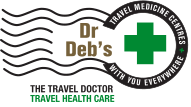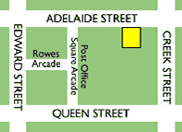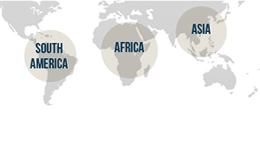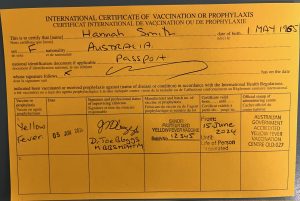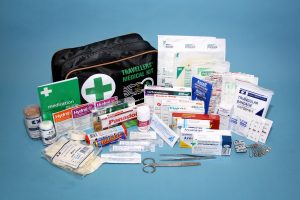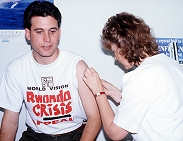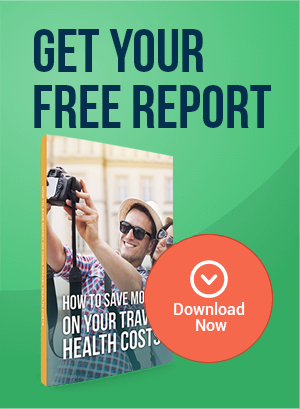Help Us Improve Access to the BCG Vaccine for Travelling Families!
November 27th, 2024 Read More »Before You Travel: Essential Travel Health Advice from Dr Deb The Travel Doctor
We know that a safe journey begins with proper preparation.
Our expert travel doctors and nurses provide comprehensive travel health advice and care, tailored to your specific travel plans.
If you just want a rough idea what vaccines you might need, go here
Why Visit a Travel Medicine Clinic ?
Our doctors can recommend exactly what you need. Visiting a specialised travel clinic like Dr Deb The Travel Doctor is an important step in safeguarding your health before you head overseas. Our travel vaccine clinic offers a wide range of services, from administering essential travel immunisations to providing detailed health advice for your destination.
We recommend scheduling a consultation 6-8 weeks before your departure to ensure you have ample time to receive all necessary vaccinations and travel health advice.
Yellow Fever Vaccine and Other Essential Travel Immunisations
Some destinations require specific vaccinations, such as the yellow fever vaccine, which is mandatory for travel to certain parts of Africa and South America. As an accredited travel immunisation clinic, we can administer the yellow fever vaccine, along with other critical travel immunisations like Hepatitis A, Typhoid, Rabies and more. Our travel doctors and travel nurses will assess your itinerary and provide you with the immunisations needed to protect your health abroad.
Key Travel Vaccinations
- Yellow Fever Vaccine: If your travels take you to particular regions of Africa or South America, a yellow fever vaccine is essential. As an accredited travel vaccine clinic, we provide this critical immunisation, along with the official Yellow Fever certificate required for entry into certain countries.
- Travel Immunisations: Our travel immunisation clinic offers a full range of vaccines, including those for Hepatitis A and B, Rabies, Typhoid, Cholera, and Japanese Encephalitis. We ensure you receive the appropriate travel immunisations for your destination.
For information on vaccines, pre-existing medical conditions and travel hazard resources, click here.
Personalised Travel Health Advice
Our travel doctors and travel nurses offer more than just vaccinations. At Dr Deb The Travel Doctor, we provide comprehensive travel health advice, including tips on avoiding common travel-related illnesses like altitude sickness, malaria and traveller’s diarrhoea.
We also have a range of products including Travellers Medical Kits available for purchase at our clinic.
We also guide you on managing existing health conditions while abroad and ensure you’re fully informed and prepared for any health challenges you may face during your travels.
Travel Health Advice for Pre-Existing Medical Conditions
If you have a pre-existing medical condition, it is particularly important to seek advice from a travel immunisation clinic before your trip. Dr Deb The Travel Doctor can help manage your health needs, ensuring you have the necessary medications and contingency plans in place in case you get sick. Our travel doctors will work closely with you to address any concerns you have, and provide the best strategies for staying healthy on your journey.
For more information on travelling safely with a pre-existing medical condition, click here.
Why Visit Dr Deb The Travel Doctor?
Dr Deb The Travel Doctor is not just any travel vaccine clinic. We are committed to offering personalised, expert care for all travellers. Our immunisation clinic is staffed by experienced travel doctors and travel nurses who understand the complexities of international travel health. We take the time to understand your unique travel plans and health needs, ensuring you receive the most accurate and relevant advice.
To learn about Dr Deb and her passion for travel medicine, click here.
Medicare Rebates
Medicare rebates are not available for individuals travelling for work purposes, as these consultations are typically claimed through tax. However, consultations for recreational travel are eligible for Medicare rebates.
| Description | Consult Fee | Medicare Rebate | Gap – out of pocket |
| Simple | 95 | 42.85 | 52.15 |
| Standard | 175 | 82.90 | 92.10 |
| Complex | 235 | 122.15 | 112.85 |
Nurse Fees
Level 1 ( usual first visit ) $10
Level 2 ( usual subsequent visits) $35
Level 3 ( extended nurse visit ) $60
Nurse fees are not rebatable through medicare.
Note that cancellation fees are charged if an appointment is cancelled with less than 24 hours notice.
Vaccines & Medications
If you have ‘extras’ cover with a private health fund, some vaccines and medications may be eligible for a rebate. Each fund varies, but typically, you may pay the first $30-40 and then be reimbursed for the remaining vaccine cost, up to your fund’s limit. Please note that HICAPS is not available for prescriptions at travel clinics, as the vaccines lack item numbers. However, we will provide all necessary receipts for you to claim in the usual manner.
To help keep your health costs down, we require payment at the end of your visit. Our clinic accepts cash, EFTPOS, MasterCard, Visa, and AMEX.
Vaccine Side Effects
Generally, the side effects of modern vaccines are minor. However, it’s advisable to receive vaccinations well before your departure, just in case any side effects occur. Our clinic will provide detailed information about each vaccine and any potential side effects that you might experience.
On the day of your vaccination, most people can continue with their usual activities, such as working, driving, playing sports, or going to the gym. However, it’s best to ‘take it a bit easy.’ Fortunately, modern vaccines do not leave scars.
For more information on vaccine side effects and related issues, please consult our clinic.
What to Expect During Your Appointment
Upon arrival, you’ll complete a form providing essential details about your medical history, travel destinations, and planned activities.
You’ll then meet with one of our expert Travel Doctors, who will discuss your personalised recommendations for your trip, including necessary vaccinations, malaria prevention, medical kits, and how to manage potential health risks like altitude sickness.
You’ll receive a complimentary copy of Travelling Well, a comprehensive guide to ensuring a safe and healthy journey.
All necessary vaccines are conveniently available on-site, so there’s no need to visit a pharmacy.
Our Travel Doctors or specially trained Nurses will administer the vaccines and provide advice on avoiding common travel-related issues, using your travel medical kit, and ensuring you have the correct documentation to carry medications overseas without complications.
Additionally, our clinic offers a selection of products designed to enhance your travel safety, such as military-grade mosquito repellent, specially treated mosquito nets, and security locks for your luggage.
Are you visiting as a family? Click here for specialised information to ensure your family visit is smooth sailing.
What Should I Bring to the Appointment?
Please bring the following items to your appointment:
- Your past vaccination records. We will access your Australian (Medicare) Immunisation Record. If you have an international vaccination record book, bring it along. If not, you may need to request a written vaccination record from your doctor. During your consultation with The Travel Doctor, you will be issued an international standard vaccination record book.
- Details of your trip itinerary, including any tours you will be taking (e.g., a brochure outlining your trip).
- A list of any medications you take regularly or occasionally.
It’s advisable to have a meal before visiting the clinic, as this can reduce the risk of feeling faint after receiving immunisations. However, if you are coming for a medical screening or company medical, you may need to fast for 8 hours prior to your appointment so that we can perform blood tests, such as those for cholesterol. If you’re unsure, please ask for clarification.
I’m Afraid of Needles—Is There Another Option?
It’s perfectly normal to dislike injections. Whenever possible, we will administer vaccines orally, but sometimes injections are the only way to protect you from certain diseases.
If you were to contract one of these diseases, you’d likely face more needles for blood tests and treatments than a single vaccination.
When the time comes for your vaccination, you might be pleasantly surprised. We understand that injections can be intimidating, and we take your concerns seriously. With our extensive experience in administering immunisations, we strive to make the process as painless as possible. For those with a needle phobia, please advise our reception staff when you make your booking so our receptions staff can make the necessary arrangements.
What Information Is Available Over The Phone?
Our reception staff can assist with clinic details and appointment scheduling but cannot provide specific advice on which vaccines you need. Individualised medical information is not available over the phone. Please note that our phones are managed by reception staff, not doctors, as our doctors are fully occupied with patient consultations and cannot be interrupted.
Travel Health Advice By Destination
For comprehensive and reliable background health information on your destination, the US Centers for Disease Control and Prevention (CDC) is an excellent resource. It provides essential details about potential health risks associated with various countries.
However, the CDC’s general guidelines may not fully address your specific needs. For personalised advice tailored to your unique trip and health profile, we recommend consulting one of our Travel Doctors.
Book An Appointment At Dr Deb The Travel Doctor
Don’t leave your health to chance. Before you travel, visit Dr Deb The Travel Doctor on Adelaide Street, Brisbane City for a comprehensive consultation. Our travel clinic is dedicated to providing you with the best travel health advice, tailored immunisations, and peace of mind, so you can enjoy your journey safely.
The nearest parking (if your vehicle is under 1.93m) is Post Office Square carpark. It is cheaper if you book online.
Contact us today to schedule your appointment at our travel immunisation clinic and take the first step toward a healthy and enjoyable trip.
Mpox and risk to Travellers
August 22nd, 2024 Read More »
Understanding Japanese Encephalitis: A Travel Health Advisory
June 10th, 2024 Read More »